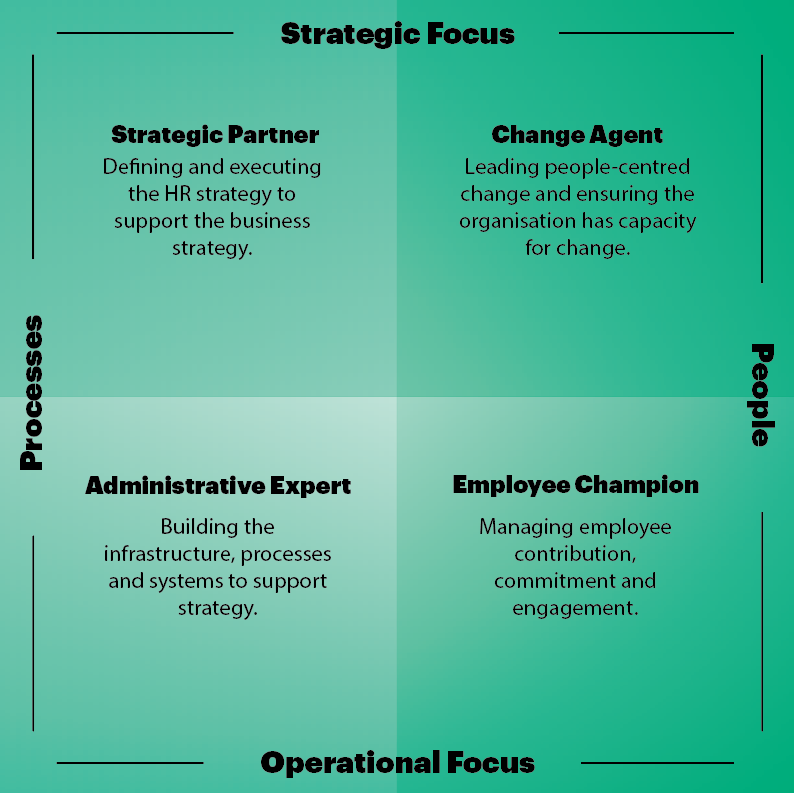When Swann Global was a mere four years old, Professor Dave Ulrich of the University of Michigan published Human Resource Champions: The Next Agenda for Adding Value and Delivering Results (1997).
The author suggested a repositioning of the human resources function, where HR professionals were relieved of the burden of personnel administration and freed to add more value by taking on four core roles:

For those in HR, it was an exciting proposal for how the profession could break free from the shackles of old-fashioned perceptions and take a strategic role in the organisation.
Leadership teams recognised the potential value of this realignment, though some line managers were resentful that the ‘administrivia’ of people management was devolved to them.
I believe Ulrich’s core recommendations continue to provide a useful guide for HR functions that want to be taken seriously by their colleagues. But much has changed in the subsequent decades, and the expectations and responsibilities of HR have evolved.
Millennials and their Gen Z successors now dominate the workforce, and many come with very different expectations from their predecessors. Technology has advanced at an unparalleled rate and is being used on an unprecedented scale in all parts of business and our day-to-day lives. New forms of employment have emerged, and we are witnessing greater globalisation of the workforce.
It truly is an exciting time in Human Resources, and I confidently predict the pace of change will only accelerate, creating opportunities for those who are able to keep up.
In this article, I’ll summarise the areas where I anticipate the most significant changes can be expected.
1 The changing nature of HR Roles
The composition of businesses and workforces will continue to change, and the expectations of employees will increase as they compare their experiences in the workplace with those as a customer served by the like of Apple, Google and Amazon.
HR will be required to take on new roles to meet these expectations. This is at least as critical in mining, where the workforce is ageing, and a skills shortage looms, as it is in any other industry.
1.1 Coaches and consultants
HR professionals will become ‘Talent Brokers’, focused on coaching individuals throughout their careers, advising on development opportunities and pathways to specific roles. This may involve secondments or even periods in other industries or organisations.
I see a growing need for HR professionals to monitor the mental health of executive management and all employees. One of the most positive developments in recent years has been the increased openness about mental health issues. Now, there is no excuse for ignoring it.
1.2 Experience designers
A key role for HR will be to create employee experiences that attract and retain employees, building brand loyalty that mirrors their experience as consumers. This means creating environments, designing roles and nurturing communities that result in a workplace which people enjoy being part of.
1.3 Contributors to business success
Building on Ulrich’s proposed Strategic Partner role, I believe HR needs to play an even greater role in setting the vision and mission for organisations as employee attraction and engagement are increasingly recognised as critical to financial success.
HR professionals should develop a deeper and broader knowledge of their organisations and the industry so they can work with the C-suite with insight and credibility and align HR initiatives with organisational goals.
2 The rise of technology and analytics
Technology has been instrumental in streamlining and automating many HR processes over recent years. The analytical data provided has been embraced as an effective way of predicting or assessing employee retention, recruitment strategies and other practices.
2.1 Online experience designers
HR professionals will need to ensure the expectations of employees who are digital citizens are met. This means, as a minimum, that information needs to be easily accessible by desktop, tablet or smartphone, 24/7.
Platforms employees use to interact with the business will also need to reflect their day-to-day digital lives. The experience of applying for a role or recording leave on an HR Information System, for example, needs to be as intuitive as posting a social media update.
2.2 Automation experts
AI and robots are in their early stages but they are already changing the world of work fundamentally. Whole professions are disappearing in the face of automation.
This presents both
There is a significant opportunity to automate many routine HR tasks, freeing up HR professionals’ time for more value-added or interpersonal work.
2.3 Data analysts
I anticipate great opportunities for people working in HR who can analyse and interpret the vast quantities of data that new technologies can generate. The C-suite will be looking to individuals who not only present the data but also turn it into information that informs strateg.
This may not sit comfortably with many currently working in the profession, but if there is one skill I would encourage all HR professionals to develop, it would be this.
3 Preparing for a new workforce and new ways of working
Mining is facing the twin challenges of a rapidly ageing workforce with insufficient talent entering the industry to replace it. HR plays a central role here in attracting and retaining new generations into the industry and ensuring they bring in people with the right skills to meet the future demands of the sector.
3.1 PR agents
It is incumbent upon us all in the industry to change the perception of mining through communication, education and best practice operations. These activities need to encompass a broad range of stakeholders, including communities, governments, regulators and of course, potential employees.
To attract new talent to mining, HR and the leadership as a whole should work with educators and policymakers to position the industry as a positive contributor to society and an attractive alternative to technology careers that may be considered ‘cleaner’.
This topic is explored in more detail here: Is mining education failing the industry?
3.2 Proposition developers
Employee value propositions (EVPs) are nothing new to most senior HR professionals, but I predict greater adaptability will be needed in future.
I believe we may see the emergence of benefits packages and EVPs that are customised to the needs of individuals? At the least, I can foresee a need for different propositions for permanent workers, gig workers and contractors.
3.3 Global coordinators
Increased globalisation will inevitably lead to a more diverse workforce, and HR will need to find ways to facilitate employees from different backgrounds working together effectively all over the world.
This is a technological challenge as well as a cultural one. HR should champion the opportunities afforded by technology for remote working and virtual communications to improve the connectivity and flexibility of individuals, teams and the wider organisation.
Preparing for future transformation
Change never stops, and the skills required to cope with change will continue to evolve. HR plays a role in identifying future skills requirements and developing or attracting people with these skills into the workforce.
HR professionals should build closer links with the operational assets where innovation is driving the pace of change if they are to do this well. With insight, HR is better able to seek out the skills needed and to develop training plans and talent succession maps as organic documents.
Future roles
I’ve presented just a few ideas for how the responsibilities of the HR function will change over the next few years. I expect the emergence of new job titles to deal with these responsibilities, such as:
- Organisational Psychologist
- Employee Experience Specialist
- HR Data Scientist or Analyst
- Chief HR Technology Officer
- Head of Candidate Experience
- Performance Coach
There will certainly be many more we can’t even anticipate. “Prediction is hazardous, especially about the future”, as the old proverb has it.
Whatever the future brings, Swann and Cygnet will use our expertise and experience to help our customers prepare
John Murray, Chairman of the Swann Group


